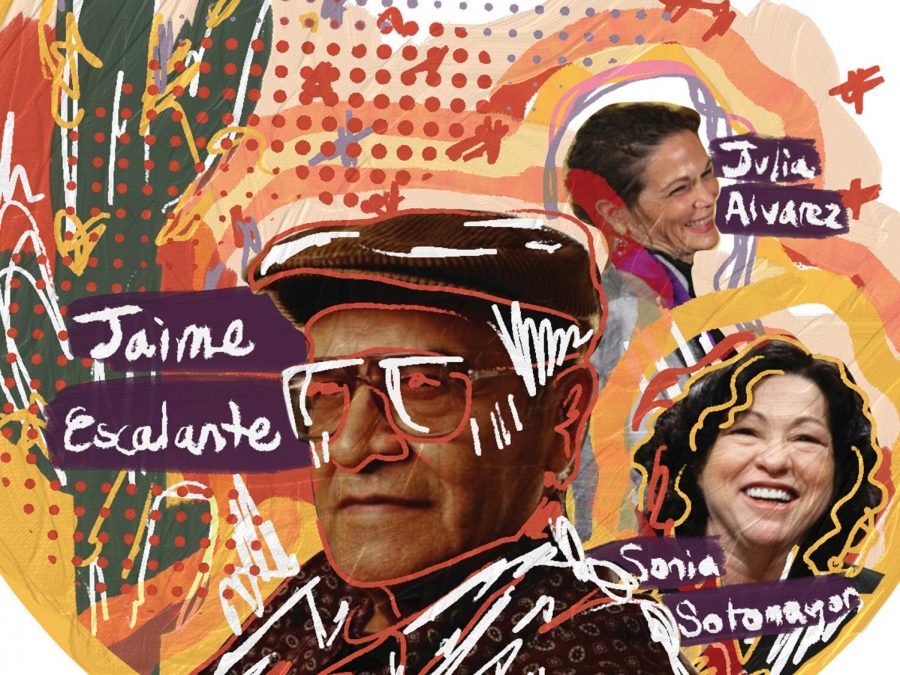Hispanic Heritage Month: A Love of Culture
From September 15th, an independence day for multiple Spanish speaking countries, many celebrations are planned for Hispanic Heritage
Art of three Hispanic politicians
October 23, 2020
National Hispanic Heritage Month is a month full of representation that commemorates the culture, history, and traditions of Hispanic and Latinx Americans all across the United States.
“It is a month of celebration not just to those of Mexican culture but to all Latinx people as it begins on September 15, the independence day of [multiple Spanish speaking countries],” Annia Cano ‘22 said.
Such celebrations include preparing events that contain different types of traditional foods, music/dances, parties, and other festivities. For City High Students and Staff, this celebration is a great opportunity to educate oneself about Hispanic/Latinx cultures and heritages that have helped shape countries and societies to what they are today.
“Celebrating diversity and inclusion in our country is important because we live in a society that’s made up of a lot of different people, and there are some people that are more privileged than others and they sometimes don’t realize that,” Jordan Garrett, a City High Spanish teacher said. “Celebrations like Hispanic Heritage Month, Black History Month, or Pride Month, are all good ways to bring about awareness for people that are not cognizant and/or recognized enough as they contribute to different parts of society.”
This celebration was first created under President Lyndon B. Johnson’s presidency in 1988 that was first known as Hispanic Heritage Week. It was then extended to a month by President Ronald Reagan, sparking even more celebrations around the world.
“I’m Hispanic, my parents are Honduran which makes me an American-Honduran since I was born in the U.S. [so I believe] It’s important to celebrate the history as a whole when celebrating your country’s Independence Day and knowing the struggles it took for a country to become its own, especially since most Hispanic speaking countries have a lot more disadvantages when dealing with resources and economic issues. It brings people together and the whole country just becomes a neverending bright, prideful, cheerful party/month made for celebration,” Jancy Solano ‘21 said.
The United States is the second-largest Spanish-speaking country by population, so it is important to take into consideration those who make up a large part of the community. Celebrations like Hispanic Heritage Month allow people to advocate, raise awareness, and educate others about issues within their own community.
“[As a Mexican American I believe] there are people who really love our culture and the people in it. But you will also find some who hate us and envy our hard work and labor. Those people who hate and put us down and believe the lies that have been forced upon them for so long don’t stop to see or relate to us as humans and the struggles we face. When in reality we are a very loving community. If we were given a chance I think people would change their views on our people,” Annia Cano ‘22 said.
Over the years, the Spanish speaking community has continued to receive negative attention in both media and society. This has been due to a lack of education and awareness of the Hispanic/Latinx community itself.
“Knowing who is the president of the U.S. and the [number] of supporters that individual has, I feel like it’s become harder for Hispanics to be truly open to this celebration since most Americans aren’t fully educated around the importance of this month,” Solano said. “For example, I’ve seen videos going around in which certain white Americans are stuck in traffic because of large crowds celebrating Mexico’s Independence Day which I can totally understand because if Americans have the 4th of July to celebrate freedom, then why can’t the Hispanic community do the same? It’s just really sad to see how individuals in this country react to others being proud of where they’re from if they get the privilege to do so without any setback from anyone.”
As for representation at City High, many students and staff feel as if the Hispanic and Latinx community and other cultures aren’t well represented at City High as they should be. An Instagram page under the name Latinos at ICCSD (that is run by a Latino student from City High) has even been made to raise awareness of discrimination and racism from schools in the ICCSD area, including City High.
“There are stories [from students] saying that there have been teachers who put down other students due to race and the simple fact that “most Hispanics and or Latinos are undocumented” when yes most of the Latino students at City are children of undocumented parents or undocumented themselves, that just means they need extra help with all that they have gone through and the fact that they can be ripped away from their families and fall in the wrong path,” Adrien*, the owner of Latinos at ICCSD Instagram page said.
A club that was recently made called CHULAs that included Hispanic girls around the school never got the attention it deserved as co-leaders of the group were in charge of promoting it with little assistance and within a week their posters were all taken down.
“We as a staff could do a better job of supporting [students]. There’s a lot of time involved with those things but we could definitely be doing a lot more to support those groups. It’s definitely incumbent on us as teachers and other adults in this school district to also take a big role [in helping students]. There are a lot of students that are pushing for a lot of positive things and that the staff could help them out with even more than what we’re doing right now. [The language teachers’ side] could reach out to others outside of our department with the school, teachers, and administrators that we don’t see every day or work with all the time,” Garrett said.
Like all communities, there is still some divide in the Hispanic and Latinx community surrounding traditional values and morals that many second-generation immigrants have to deal with, but being able to put these differences aside and come together during this month of celebration has been a great way to unify the community.
“[The Hispanic/Latinx community has had] rough patches and sometimes we make mistakes but we can not judge based on those mistakes. We can not define one whole group for the wrongdoing of one. The Hispanic/Latinx community is loving and kind and loves to celebrate those it loves. Sometimes we’re in the wrong but we are learning and growing like any other community,” Cano said.
Issues within celebrations like Hispanic Heritage month and other Hispanic and Latinx cultural events have to do with learning the difference between cultural appropriation versus appreciation. Cultural Appropriation is defined as an inappropriate adoption of the customs, practices, ideas, etc. of a culture/society by members of another and typically more dominant culture or society, whereas cultural appreciation is when a person earnestly seeks to learn about a culture and continuing to honor its beliefs and traditions.
“There’s definitely cultural appropriation that happens to the inappropriate taking or adoption of cultural artifacts, practices, and attitudes. Sometimes people start with the best of intentions and are just not aware of the history or the importance of things[while others] do it in a hostile way [by thinking] you’re celebrating someone’s tradition [with things like] language use or wearing a traditional costume in an inappropriate way can be offensive. Whether or not that person is trying to offend [anybody],” Garrett said.
It all comes down to proper education as it is truly one’s choice to help and educate themselves on the topic rather than doing what’s “trending” as it is seen as much more appreciative of other cultures as well.
“If you wanna celebrate someone else’s culture go right [ahead]but do not do it in an offensive way. Educate yourself first and only celebrate it by showing your support, not by claiming it as a celebration made just for you but a celebration for those you love,” Cano said.
“I’m proud to be a part of the Hispanic community because I’ve gotten to love the language my parents have taught me, the food, the music, etc. I love using Spanish to communicate with others in my community if they need help,” Solano said.
Making time to commemorate and teach the traditions and heritages of cultures during events like Hispanic Heritage Month at school with classes such as Social Studies can be a beneficial way for students and others who want to learn more about the culture to be able to have access to a credible outlet.
“I think this month is covered with many beautiful Latinx and Hispanic people and countless others. I am proud of the pride and love we have for [our culture] and I am proud of the countless celebrations we have year-round [that celebrate] all the little things and big things. I love the vibrant colors we show to represent some of the many things we love and am especially proud of my people for constantly working hard and proving those wrong when they say we are nothing. I think this month is very well covered with many beautiful Latinx and Hispanic people and countless others,” Cano said.
The name of the person who runs the Latinos at ICCSD Instagram account has been changed for anonymity.

































